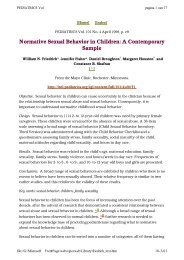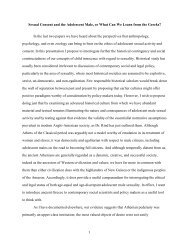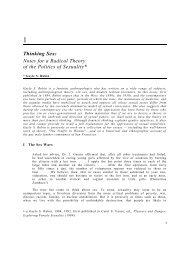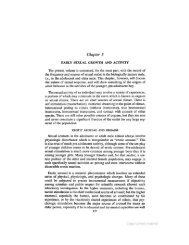Infant and Child Sexuality: A Sociological Perspective - Ipce
Infant and Child Sexuality: A Sociological Perspective - Ipce
Infant and Child Sexuality: A Sociological Perspective - Ipce
You also want an ePaper? Increase the reach of your titles
YUMPU automatically turns print PDFs into web optimized ePapers that Google loves.
In other words, I was to avoid him, <strong>and</strong> that<br />
suited me just fine. I remember that I sat down<br />
<strong>and</strong> felt much better for having “told” on him.<br />
I’d known all along that what he had done was<br />
wrong. My mother said that older people enjoyed<br />
it, however, <strong>and</strong> he had said that his girlfriend<br />
did too. I still couldn’t believe that. The<br />
thought of it made me sick, <strong>and</strong> I was relieved<br />
that it hadn’t happened to me.<br />
Now, as I look back on that incident, I’m<br />
glad my mother didn’t tell me everything right<br />
then. I was quite upset, <strong>and</strong> a long sex<br />
explanation would have only made me more so. The<br />
fact that I knew older people did do “that” <strong>and</strong><br />
“liked it” was all I needed to know right then.<br />
I was never so happy to see my parents. After we<br />
got to the car I told them what had happened. I<br />
could not underst<strong>and</strong> why they did not say much<br />
about it, nor did it seem to bother them. I<br />
realize now that I was pretty upset <strong>and</strong> that if<br />
they had made a big thing about it, it may have<br />
upset me even more.<br />
Patterns of sexual life developed in early childhood are strongly<br />
regulative <strong>and</strong> difficult to change in later life. Whatever patterns of<br />
sexual life one later comes to consider desirable or whatever changes<br />
one seeks to make in his socio-sexual attitudes, it is certain that it<br />
will be difficult because of roots of sexual behavior established in<br />
childhood. (Gagnon, 1965). Broderick sees a positive attitude towards<br />
socio-sexual encounters, including commitment to one’s own eventual<br />
marriage, as almost a prerequisite to further heterosexual progress<br />
during the preadolescent <strong>and</strong> adolescent stages of development. (Broderick,<br />
1966).<br />
Parents who go to great effort to protect their child from the normal<br />
intimate, sexual experiences of childhood may unconsciously do the<br />
very things that are designed to defeat their purposes. Frustration or<br />
the withholding of positive reinforcement of intimacy needs may result<br />
in an increase rather than a decrease in the motivation to satisfy such<br />
needs. (B<strong>and</strong>ura <strong>and</strong> Walters, 1963). It is a moot question, is it the<br />
repressive rather than the permissive parents who contribute most to<br />
the high level of personal interest in sex <strong>and</strong> the high sexual-erotic<br />
content of our culture? Those who support the repressive sexual socialization<br />
of children do so largely out of fear that they will misbehave<br />
sexually if sensory, affectional, <strong>and</strong> sexual appetites are not repressed<br />
from infancy <strong>and</strong> on. It is true that the clinical literature<br />
provides ample evidence of unwise or disturbed parents who willingly or<br />
unwillingly encourage <strong>and</strong> reinforce deviant <strong>and</strong> antisocial sexual behavior<br />
in their offspring. It is true also that because of varying<br />
types of upbringing, individuals differ in the extent to which they are<br />
able through self-restraint to tolerate delay of reward. But there is<br />
also extensive research evidence demonstrating that responsible behavior<br />
can be readily elicited if appropriate models are provided.<br />
(B<strong>and</strong>ura <strong>and</strong> Walters, 1963). And if a child is exposed to a variety of<br />
72
















